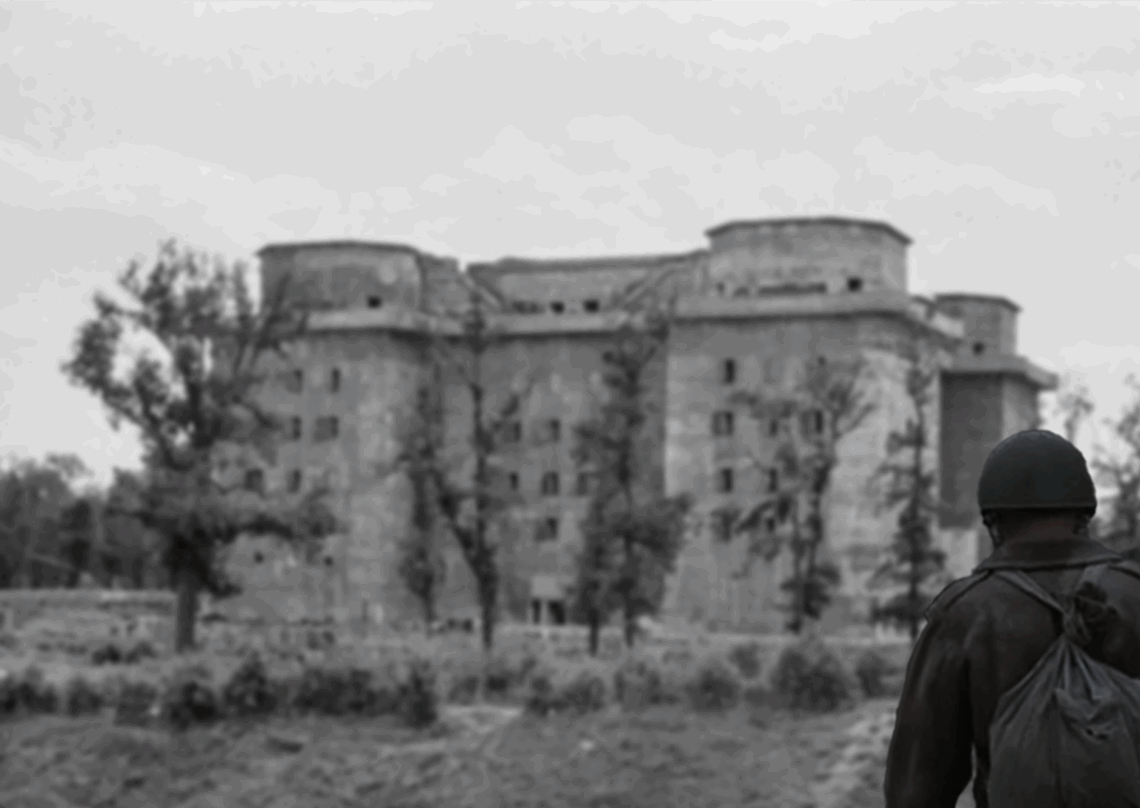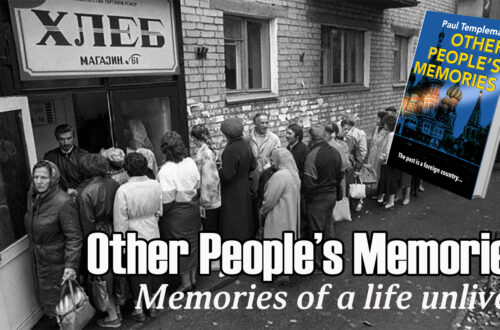Berlin Zoo – July 1945
Even the summer sun was ashamed to show its face, shrouded by ashen clouds that glowed as if from distant shell fire. Dust hung leaden in the air, and carcasses of once proud buildings spilled their viscera onto desolate streets where the contents of former homely retreats were raked into cellars and yards and pillaged by rabid dogs.
Major Kirinov abandoned the lend-lease jeep in the middle of the cratered street and picked his way through the rubble. In a flurry of dust and noise an open truck passed, its engine labouring, black exhaust billowing. It weaved around the lumpy corpse of an elephant, an ill-fated refugee from the demolished Berlin Zoo. The soldiers in the back were grim and passive in outsize helmets, clinging to the skeletal frame of the truck. They looked like orphans.
The Berlin Zoo Flakturm was built on a colossal scale, grim and gaunt with fortress-like ramparts and an entrance flanked with iron staircases supported by concrete pillars. He estimated its width to be around 80 metres. In white letters somebody had painted in German: ‘Better dead than slaves’. Shell crumpled steel shutters hung from empty windows. If some ancient Norse God had carved a fortress out of rock, it would look like this: majestic and brutal, he thought looking up. It brought to mind the painting: The Fortress of Königstein by Bellotto, which now spurred a pang of nostalgia. He missed his desk in the Hermitage Museum.
In front of the entrance a small commotion as an officer, pointing and cursing, despatched ragged Red Army soldiers in all directions. Kirinov limped towards him. His boots were tight, and they pinched his feet. Red Army issue – size less important than quantity.
The officer looked at him. ‘Fuck off Comrade Major,’ he said almost in passing. A captain who looked 40—which was about Kirinov’s age—but maybe you could halve that. War has ravaged us all, reflected Kirinov, standing his ground with uncertainty and fear. The officer’s cheeks were grey and streaked with dirt, but his eyes had a glint of cunning. ‘Politely. Fuck off. SMERSH has business here.’
SMERSH—Stalin’s ‘Death to Spies’ unit—was anarchic, brutal, and feared even within the Red Army. Kirinov knew their reputation for arbitrary killings, and he sucked in his breath before addressing the Captain. ‘Are you in charge?’ He hoped his voice didn’t tremble.
‘Are you deaf?’ The officer rested his hand on his holster, like a threat.
‘I have business here too, Comrade Captain.’ He outranked the captain, but not here. Not ever, in reality. In any case he wasn’t a real Major – he was an academic. The rank was a flag of convenience, and it embarrassed him. It was uniforms and ranks that were to blame for all this—marching boots, glittering insignia, and rousing canticles? Now it was over. Or was it?
Two Red Army soldiers dragged an emaciated man in an army greatcoat several sizes too large to where the officer stood, his heels making furrows in the dust. The soldiers clasped the folds in the man’s coat yanking him upright. It was a warm day and the sweat wriggled down his forehead, his lank hair pasted to his head with sweat. Kirinov noticed there were light patches on the greatcoat where badges of rank might have been.
‘Bitte…’ pleaded the German.
‘We found this one,’ said one of the soldiers.
The officer appraised him with open contempt. ‘Kennkarte!’ he demanded in German.
‘Verloren,’ said the man in a shaky, tearful tone. The man tried without much hope to shrug free of the soldiers, but they held him fast.
‘What’s he saying?’ The officer seethed with an impatience.
The soldiers shrugged. One tugged the man for emphasis, and the man stumbled. The soldiers also looked fearful of the officer.
Kirinov said, ‘He’s telling you he lost it.’
The officer looked at him with suspicion, and grunted: ’Disposed of it, I think.’
‘Ver… verloren,’ repeated the man, struggling to make a helpless gesture with his hands and looking from the officer to Kirinov.
The officer swallowed. Schemed.
‘Shoot him.’ He pronounced finally. The two soldiers gripped the man by the arms to drag him away. ‘No, wait!’ All business now, beckoning. Then he drew his pistol, advanced a pace and shot the German through the head in a single fluid motion. Kirinov flinched. The soldiers released him, stepping aside as he crumpled in the dirt. Kirinov thought he might throw up. He backed away. The smell of cordite was sour. The German lay in the rubble, no more than a bundle of rags. The officer turned to Kirinov with suspicion, the corpse dismissed like an empty coffee cup. ‘Where did you learn German, Comrade Major?’
Kirinov’s stomach turned. His ears ringing. The order: shoot him. Death to Spies. The SMERSH officer hadn’t holstered the weapon—it hung by his side in his hand like a tradesman’s hammer, ready to take the next blow. An impulse all it took.
With a wary eye on the pistol Kirinov set out with a tremor to explain. ‘I’m an art historian. Languages are a help in my work,’ stumbling over his words. ‘I learned German in Moscow.’
The officer snorted. ‘Show me your papers, then.’ He beckoned with impatience, his head turned away. Kirinov saw he wore a brace of fine wristwatches, one an Omega and one a distinctive, rectangular gold Patek Phillipe. War booty, thought Kirinov. ‘Papers!’ demanded the officer.
Kirinov handed them over.
The officer turned his back to inspect them before returning them. Kirinov hoped he could read.
‘You can’t come here Comrade Colonel. It’s restricted.’
Kirinov looked around him at the devastated landscape. ‘But why?’
‘The Gestapo hospital is located here. Inside.’
‘A hospital?’
‘We’re questioning everyone. We believe there are high ranking Nazis amongst the wounded. Maybe even Hitler? Nobody’s found him yet.’
‘I was sent here’ Kirinov produced what he hoped was his trump card – a prized letter from Zhukov, Marshal of the Soviet Union. A legend decorated four times as a Hero of the Soviet Union, and Kirinov spoke with his authority.
The Captain scanned the letter with suspicion, then held it up and shook it by a corner as if that might be a test of its authenticity. A manic grin.
‘This real?’
‘Of course, Comrade Captain.’
He whistled and read a paragraph aloud. ‘You must assist Comrade Major Kirinov with the evacuation of all of the artistic relics of the Zoo Tower.’ He looked at Kirinov. ‘I MUST assist,’ he repeated with irony.
As though in justification Kirinov began, ‘I’m an art historian—’
‘Art? What the fuck does art matter now?’ He waved a hand at the terrain of broken masonry and furniture across the street. An upturned dressing table with three legs, and twisted lengths of copper pipe. Fractured timbers, lumps of concrete. What looked like a half interred body.
He had a point. Would it ever matter again? Blanked out like the life of the poor soul the soldiers had now hauled away and dumped amongst the rest of the war’s detritus. A lifetime lived, to end it in this hellhole.
The Captain looked from the letter to Kirinov. Kirinov thought he displayed a shrewd cunning. How he’d survived up to now, supposed Kirinov. Dogs eat dogs. The Captain cleared his throat: an involuntary tick to clear the dust. He flapped the letter at him for him to take, and Kirinov took it with care. Examined it as if for damage.
‘The Germans moved the contents of their museums to places like these. My job is to liberate them. For the revolution,’ explained Kirinov.
‘The Nazis moved them, you mean,’ said the officer. He hawked and spat.
‘Yes, Nazis,’ he conceded. ‘The towers were supposed to be impregnable. They were a safe haven. I suppose that explains the hospital also.’
They both looked up at the grim Zoo Tower as if in affirmation or in awe.
‘I’ll escort you,’ said the officer.
Kirinov folded the letter with unsteady hands and pushed it inside his tunic.
‘Thank you, Comrade Captain.’
The interior of the tower was cavernous, and the space resounded with the scrape and shuffle of army boots, the thin air abrasive with dust, damp plaster and spent munitions, and tainted with the stench of rotting corpses. Two medical orderlies in dark-stained white coats dodged past Kirinov in a hurry, crunching through broken masonry and glass.
‘Welcome to Germania,’ said the officer. ‘This place was meant to be one of the first buildings of the new Reich capital. Now it just looks like Stalingrad.’
‘Were you there? In Stalingrad?’
‘I’ve heard all the illicit stories, but no. My father died there.’
‘I’m sorry.’
The officer shrugged. ‘This way.’
They headed up a wide concrete staircase. Some of the steps had crumbled away. Kirinov, tripped and recovered, and heard groans from the makeshift hospital below. Once there was a scream.
‘What’s happening down there?’
The officer clumped up the steps ahead of him in his scuffed and scarred military boots, throwing up cement dust. ‘It’s a military hospital,’ he said over his shoulder. ‘What the fuck do you think is happening, Comrade Major? People are dying. When I came here there were 1,500 wounded down there. Now—’ he paused ‘—now, not so many.’ A shouted instruction in Russian resonated up the staircase but its meaning was lost. They reached the next floor. ‘Room 11,’ said the officer. ‘It’s along here.’
Two SMERSH guards stood on either side of a pair of iron doors. The guards barely acknowledged the officer. Everything had acquired the hue of concrete. The walls, the uniforms, the faces, caked in grime. One of the guards was smoking and regarded the officer with a defiant expression as he breathed out a clue of smoke.
‘We put guards on the doors,’ explained the officer, ‘You’ll see why.’ The guards stood aside and nobody stepped in to help as he used both hands to tug at one of the doors until it scraped open to reveal a vast concrete chamber stacked with wooden crates. There were doors to other rooms which hung open on broken hinges. ‘Here it is. Aladdin’s Cave.’
Shards of antique glass and pottery crackled under their boots as they entered. Kirinov gazed around in astonishment. He recognised the Roman Caffarelli Sarcophagus, almost intact, although its marble walls were crumbling and painted grey with cement dust. The pale light from the narrow windows was enough to pick out the skull of an ox, symbol of death and sacrifice.
Against a wall were stacked hundreds of paintings in gilt frames. Kirinov approached them with awe, barely daring to lay a hand on them. Tipping aside a Titian, there beneath was a Rubens. His hands were trembling, hardly daring to touch these ancient masterpieces.
He stifled a gasp. ‘My God – look! It’s Pan by Luca Signorelli!’ he cried out.
‘Doesn’t look that much to me,’ said the officer. ‘But then, I’m not an educated man. Not like you.’ It stung like an accusation, and Kirinov looked aside with a tremor of fear. He remembered the way the officer had shot the German outside the tower without a thought. It was wise to keep in mind that this man was a killer. Death to Spies. He needed to take care, whatever the importance of his mission. Zhukov’s letter wouldn’t protect him here. A paper shield.
Kirinov kneeled and pecked at the canvass with a tentative fingernail to reveal the gold and vermilion beneath the veil of dust. ‘Just wonderful. Just incredible. I never imagined…’
He straightened up. ‘You were right,’ he said, taking a breath and surveying the chamber. ‘Aladdin’s Cave. I’m overwhelmed. All I’ve ever read about and studied, concentrated in one wrecked building.’
‘It’s not what we studied where I’m from,’ said the officer.
Some packing cases had been torn apart. Kirinov rifled through the treasures within, lifting a gilded breastplate. ‘Trojan gold!’
‘The gold,’ said the officer. ‘That’s the reason we posted sentries. Everyone wants to know about the gold.’ As if prompted by the thought he consulted his wristwatches.
‘All of this,’ said Kirinov, barely able to contain his excitement, ‘Everything needs to be carefully packaged. Expertly packaged. Transported.’ He felt carried away by a mad exuberance. It was like his whole life had been lived in preparation for this. All of his education, all of his knowledge, accumulated for this one purpose: to act as the custodian for all of these artworks and to transport them safely to the motherland.
‘I don’t have the manpower for that, Comrade Major. And if I did I’d have better things to do with it,’ said the officer, without enthusiasm.
‘I’ll find the manpower, and I’ll… what’s through there?’ He pointed at a steel door barricaded with timber and debris.
‘Nobody’s been in there. Not yet.’
Kirinov pulled aside slabs of brickwork and shafts of wood. ‘Help me, please.’
The officer put his back into it and they cleared enough to haul open the door. Masonry barked and grated as it tumbled aside, echoing through the chamber. Then, as the door was thrust aside, Kirinov was shocked to encounter a pale face with blank eyes staring out from the cramped interior. He took an involuntary step back. There were other figures within, crowded into the space, with stiff, chiselled limbs and slender hands extending in all directions. Their carved robes made complex folds and patterns. Some of them cradled babies. A score of lifeless eyes observed him. He realised he was shivering even in the warm air.
There was an instant when pleading, expressionless eyes stared back at Kirinov before the marble fell away in swathes, disintegrating and collecting in mounds of pale powder on the grey floor. Like a fairytale scene from a bewitched castle
In panic, Kirinov knelt on the cold floor, rinsing his hands with the dust of ages, scooping it up like sand.
The officer looked shocked. ‘What happened?’
‘Was there a heat source?’
‘A heat source? A fire, in the next room. A big one. What of it?’
He noticed now that the wall on this side of the chamber was scorched. ’Extreme heat. It transforms marble into lime if there’s no oxygen. When we opened the door the oxygen reacted with the lime and… Poofff!’
Kirinov and the SMERSH officer were the last to see the masterpieces intact.






